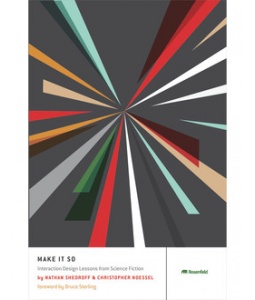 We were thrilled to be able to speak to Chris Noessel, one of the co-authors of the book Make It So: Interface Design Lessons from Sci-Fi, on the Overthinking It Podcast. We thought it’d be right up the Overthinking It audience’s alley, so much so that we’re giving away a free copy of the book to one lucky reader!
We were thrilled to be able to speak to Chris Noessel, one of the co-authors of the book Make It So: Interface Design Lessons from Sci-Fi, on the Overthinking It Podcast. We thought it’d be right up the Overthinking It audience’s alley, so much so that we’re giving away a free copy of the book to one lucky reader!
This contest will be conducted using our recently revamped Overthinking It Forums. To enter, simply leave a reply in the official contest and discussion forum topic for this book. You’ll need to register for an account if you haven’t already done so, but don’t worry; it’s super easy and requires only a username and email address from you. Your reply to the forum post can be anything you like (“I CAN HAZ BOOK PLZ” will count as an entry), but we’d love it if you could share your thoughts on user interfaces in science fiction: what you like, what you dislike, how you would expect to order Earl Grey tea from a 24th century computer, etc.
Entries in the form of forum replies must be received by 11:59 PM Eastern Time, Thursday, October 18, 2012. We will select one winner via random drawing.
Update: you must live in the US, Canada, or UK to be eligible for the contest.
Here’s some more information about the book from its introduction:
Being an interaction designer colors how you watch science fiction. Of course you’re enjoying all of the hyperspacey, laser-flinging, computer-hacking action like everyone else, but you can’t help but evaluate the interfaces when they appear. You are curious if they’ll disable the tractor beam in time, but you also find yourself wondering, “Could it really work that way? Should it work that way? How could it work better? And, of course, Can I get the interfaces I design in my own work to be this cool or even cooler?”
We asked ourselves these questions with each new TV show and each new film we watched, and we realized that for every eye-roll-worthy moment of technological stupidity, there are genuine lessons to be learned—practical lessons to be drawn from the very public, almost outsider-art interfaces that appear in the more than 100 years of sci-fi cinema and television. Then we wondered what we would learn from looking at not just one or even a dozen of them but as many as we could.
This book is the result of that inquiry, an analysis of interfaces in sci-fi films and TV shows, with lessons that interface and interaction designers can use in their real-world practice. We’ve learned a great deal in writing it, and we want to share those lessons with you.